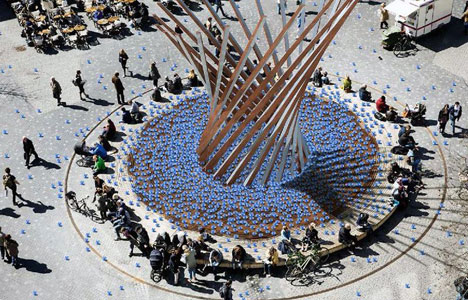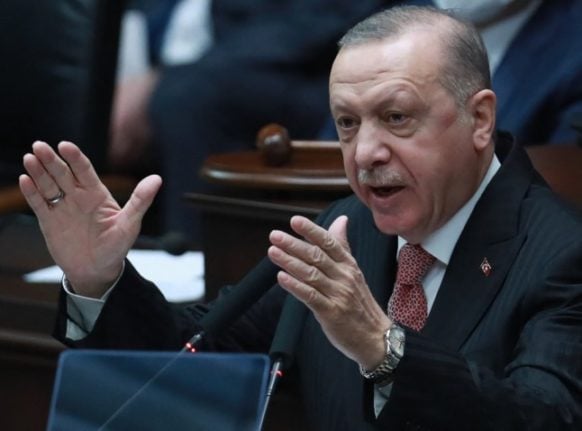TURKEY
Turkey angered by Copenhagen sculpture
Plans to install a sculpture commemorating the Armenian Genocide in one of Copenhagen's busiest squares have Turkish officials up in arms.
Published: 15 April 2015 10:23 CEST

Artists' illustration of how the sculpture will look when placed in Kultorvet. Photo: Invivia/Folkedrab100
A sculpture that will be placed in the heart of Copenhagen in commemoration of the 100th anniversary of the Armenian Genocide threatens to further derail the already-strained relations between Denmark and Turkey.
The nine-metre high sculpture, entitled ‘The Draem’ (Danish Remembrance Armenian Empathy Messenger), is to be placed in the square Kultorvet for ten days in May to mark 100 years since upwards of 1.5 million Armenians were killed by the Ottoman regime.
The plans have elicited a protest from the Turkish Embassy in Copenhagen.
“We are disappointed that a sculpture that describes the actions of 1915 as a ‘genocide’ will be displayed in one of Copenhagen’s large squares,” the embassy wrote in an email to Politiken, adding that the sculpture is “morally indefensible”.
Turkey officially rejects the notion that the mass killings constitute a ‘genocide’. While the European Parliament, a UN sub-committee and more than 20 countries worldwide recognize the killings as a genocide, Denmark does not.
“The Danish government does not keep silent about the tragic events of 1915 but has not officially acknowledged the events as genocide. Our opinion is that that distinction is better left to historians,” Foreign Minister Martin Lidegaard told Politiken.
Lidegaard declined to comment specifically on the sculpture, but Copenhagen city officials did not.
The city’s deputy mayor for culture, the Danish People’s Party’s Carl Christian Ebbesen, said Turkey should stay out of local decisions.
“Turkey should completely stay out of what we do in Copenhagen and what sort of freedoms of expression and freedoms of art that we have,” Ebbesen told Politiken.
Relations between Denmark and Turkey are already strained over long-running disagreements about the handling of Kurdish television station Roj TV and for Turkey’s release of a man suspected of trying to assassinate noted Islam critic Lars Hedegaard.
Denmark released ten Kurds charged with “terror funding” for raising up to 140 million kroner for the now-shuttered Roj TV, which in turn funded the Kurdistan Worker’s Party (PKK), a militant separatist group considered a terror organisation by the EU and the US.
The men were acquitted in October after the prosecution failed to establish “sufficient evidence that the defendants knew or should have known that a contribution to Roj TV was indirect support to the PKK,” according to the Copenhagen District Court ’s ruling. Turkish authorities were upset with the decision and demanded answers from their Danish counterparts.
Turkish authorities know want their Danish counterparts to provide an explanation for the acquittal.
Danish officials, meanwhile, were livid over an October decision by Turkish authorities to release from prison a man suspected of trying to murder outspoken Danish Islam critic Lars Hedegaard.
Denmark sent a delegation to Turkey in October to confirm the release of the 27-year-old suspect ‘BH’, a Danish citizen with a Lebanese background who is accused of trying to assassinate Hedegaard in February 2013. Although the delegation returned home with confirmation of the release, it did not receive an official explanation as to why the man was let go.
Some reports indicated that BH was released as part of a prisoner swap with terror organisation Isis.
Denmark’s justice minister, Mette Frederiksen, called the release “completely incomprehensible”.
Turkish nationals represent Denmark’s largest immigrant group. Residents of Turkish origin make up 9.8 percent of all immigrants and their descendants living in Denmark.
Url copied to clipboard!


 Please whitelist us to continue reading.
Please whitelist us to continue reading.
Member comments